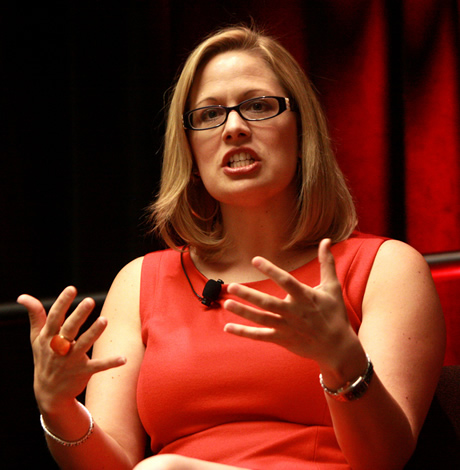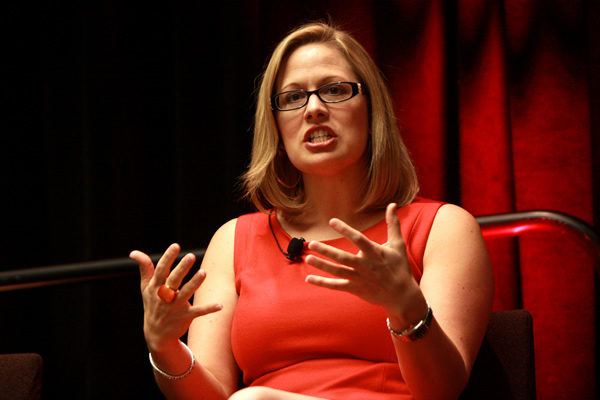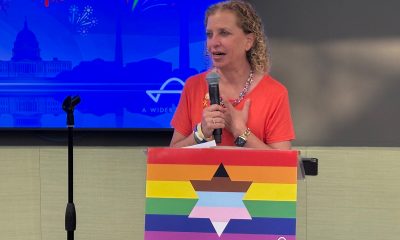News
Kyrsten Sinema wins Arizona primary, major first as bisexual candidate


Rep. Kyrsten Sinema (D-Ariz.) has won her primary in a bid foe a U.S. Senate seat. (Photo by Gage Skidmore; courtesy Flickr)
Arizona Rep. Kyrsten Sinema (D-Ariz.) achieved a significant victory on Tuesday in the Arizona primary when she became the first openly bisexual person to win a major party nomination to run for a U.S. Senate seat.
The Associated Press declared Sinema, a three-term member of Congress, the winner at 9:21 local time after polls closed in Arizona at 7 pm. Sinema was in a contest against Muslim progressive activist Deedra Abboud for the Democratic nomination to run for the open U.S. Senate seat in Arizona.
With 94 percent of precincts reporting, Sinema won 80.5 percent of the vote compared to the 19.5 percent won by Abboud, according to results from the New York Times.
The primary contest is to run for the seat being vacated by Sen. Jeff Flake (R-Ariz.), who announced he wouldn’t seek another term in the U.S. Senate and remains outspoken with his own party against President Trump. (The other seat representing Arizona in the U.S. Senate after the death of John McCain will be filled by a interim replacement chosen by the Arizona governor and come up for a vote in the general election in 2020.)
As the only openly bisexual member of Congress and co-chair of the LGBT Equality Caucus, Sinema has taken the lead on LGBT issues during her time in Congress. Among other things, Sinema was a co-sponsor of the Equality Act, comprehensive legislation that would prohibit anti-LGBT discrimination in all areas of federal civil rights law and legislation against Trump’s attempted ban on transgender service members.
Representing a moderate district in Congress, Sinema has taken votes in line with the Republican caucus that have angered progressive and LGBT activists. Sinema has never voted for House Minority Leader Nancy Pelosi (D-Calif.) as speaker, voted to delay implementation of the individual mandate in Obamacare and voted for a measure that would have inhibited Syrian refugees from coming to the United States.
Also revealed in the Arizona primary was the Republican opponent whom Sinema would face in the general election. The winner on the Republican side was Martha McSally, a former Air Force pilot who represents Arizona’s 2nd congressional district in Congress.
Other candidates were Kelli Ward, a former member of the Arizona State Senate, and former Maricopa County Sheriff Joe Arpaio, who declared his candidacy after President Trump granting him a pardon for violating the law in his enforcement of immigration law.
McSally won 52.9 percent of the vote in the Republican primary, compared to the 28.2 percent won by Ward and the 18.9 percent won by Arpaio.
Although McSally has served in the U.S. House for only two terms, she has already cast at least one anti-LGBT vote. The Arizona Republican vote in favor of an amendment on the House floor introduced by anti-LGBT Rep. Vicky Hartzler (R-Mo.), which would have the barred from the U.S. military from paying for transition-related care for transgender people, including gender reassignment surgery.
McSally has also opposed interpreting Title IX of the Education Amendment of 1972 to require school to allow transgender kids to use the restrooms consistent with their gender identity, saying during a town hall early last year the matter is best handled at the local level.
In 2016, McSally was also one of the 33 Republicans in committee to vote in favor of an amendment to major defense authorization legislation that would have weakened President Obama’s executive order against anti-LGBT workplace discrimination. Although the committee approved the amendment, it was later taken out in conference deliberations.
Annise Parker, CEO of the LGBTQ Victory Fund, said Sinema “shattered a lavender ceiling” in the primary, but the race against McSally will also be significant.
“This race is consequential not just for the Democratic party and for the LGBTQ community, but for all Americans who demand an end to the political divisiveness that Martha McSally embodies,” Parker said. “An LGBTQ Senate candidate taking down an anti-LGBTQ opponent in a red state will be a defining moment in this year’s rainbow political wave – and will further the evolution in how Americans view LGBTQ people and candidates.”
Sinema wasn’t the only LGBT candidate in a primary race on Tuesday night. Other LGBT candidates were in the fray in Arizona and Florida and had different results:
* In Florida’s 18th congressional district, lesbian candidate and former State Department official Lauren Baer won the Democratic nomination over attorney Pam Keith by a 60-40 margin. Baer will face off against incumbent Rep. Brian Mast (R-Fla.) in the general election.
* Also in Florida, Donna Shalala, a former official with the Department of Health & Human Services during the Clinton, narrowly defeated openly gay State Rep. David Richardson for the Democratic nomination to run in Florida’s 27th congressional district. Shalala will run against Maria Elvira Salazar in race to succeed retiring Rep. Ileana Ros-Lehtinen (R-Fla.) in Congress.
* In Arizona, gay candidate and former Arizona State Rep. Matt Heinz came up short in a bid to claim the Democratic nomination to run in Arizona’s second congressional district against former U.S. Rep. Ann Kirkpatrick.
New York
Two teens shot steps from Stonewall Inn after NYC Pride parade
One of the victims remains in critical condition

On Sunday night, following the annual NYC Pride March, two girls were shot in Sheridan Square, feet away from the historic Stonewall Inn.
According to an NYPD report, the two girls, aged 16 and 17, were shot around 10:15 p.m. as Pride festivities began to wind down. The 16-year-old was struck in the head and, according to police sources, is said to be in critical condition, while the 17-year-old was said to be in stable condition.
The Washington Blade confirmed with the NYPD the details from the police reports and learned no arrests had been made as of noon Monday.
The shooting took place in the Greenwich Village neighborhood of Manhattan, mere feet away from the most famous gay bar in the city — if not the world — the Stonewall Inn. Earlier that day, hundreds of thousands of people marched down Christopher Street to celebrate 55 years of LGBTQ people standing up for their rights.
In June 1969, after police raided the Stonewall Inn, members of the LGBTQ community pushed back, sparking what became known as the Stonewall riots. Over the course of two days, LGBTQ New Yorkers protested the discriminatory policing of queer spaces across the city and mobilized to speak out — and throw bottles if need be — at officers attempting to suppress their existence.
The following year, LGBTQ people returned to the Stonewall Inn and marched through the same streets where queer New Yorkers had been arrested, marking the first “Gay Pride March” in history and declaring that LGBTQ people were not going anywhere.
New York State Assemblywoman Deborah Glick, whose district includes Greenwich Village, took to social media to comment on the shooting.
“After decades of peaceful Pride celebrations — this year gun fire and two people shot near the Stonewall Inn is a reminder that gun violence is everywhere,” the lesbian lawmaker said on X. “Guns are a problem despite the NRA BS.”
India
Anaya Bangar challenges ban on trans women in female cricket teams
Former Indian cricketer Sanjay Bangar’s daughter has received support

Anaya Bangar, the daughter of former Indian cricketer Sanjay Bangar, has partnered with the Manchester Metropolitan University Institute of Sport in the U.K. to assess her physiological profile following her gender-affirming surgery and undergoing hormone replacement therapy.
From January to March 2025, the 23-year-old underwent an eight-week research project that measured her glucose levels, oxygen uptake, muscle mass, strength, and endurance after extensive training.
The results, shared via Instagram, revealed her metrics align with those of cisgender female athletes, positioning her as eligible for women’s cricket under current scientific standards. Bangar’s findings challenge the International Cricket Council’s 2023 ban on transgender athletes in women’s cricket, prompting her to call for a science-based dialogue with the Board of Control for Cricket in India and the ICC to reform policies for transgender inclusion.
“I am talking with scientific evidence in my hand,” Bangar said in an interview posted to her Instagram page. “So, I hope, this makes an impact and I will be hoping to BCCI and ICC talking with me and discussing this further.”
On Nov. 21, 2023, the ICC enacted a controversial policy barring trans women from international women’s cricket. Finalized after a board meeting in Ahmedabad, India, the regulation prohibits any trans player who has experienced male puberty from competing, irrespective of gender-affirming surgery or hormone therapy. Developed through a 9-month consultation led by the ICC’s Medical Advisory Committee, the rule aims to safeguard the “integrity, safety, and fairness” of women’s cricket but has drawn criticism for excluding athletes like Canada’s Danielle McGahey, the first trans woman to play internationally. The policy, which allows domestic boards to set their own rules, is slated for review by November 2025.
Bangar shared a document on social media verifying her participation in a physiological study at the Manchester Metropolitan University Institute of Sport, conducted from Jan. 20 to March 3, 2025, focused on cricket performance. The report confirmed that her vital metrics — including haemoglobin, blood glucose, peak power, and mean power — aligned with those of cisgender female athletes. Initially, her fasting blood glucose measured 6.1 mmol/L, slightly above the typical non-diabetic range of 4.0–5.9 mmol/L, but subsequent tests showed it normalized, reinforcing the study’s findings that her physical profile meets female athletic standards.
“I am submitting this to the BCCI and ICC, with full transparency and hope,” said Bangar. “My only intention is to start a conversation based on facts not fear. To build space, not divide it.”
In a letter to the BCCI and the ICC, Bangar emphasized her test results from the Manchester Metropolitan University study. She explained that the research aimed to assess how hormone therapy had influenced her strength, stamina, haemoglobin, glucose levels, and overall performance, benchmarked directly against cisgender female athletic standards.
Bangar’s letter to the BCCI and the ICC clarified the Manchester study was not intended as a political statement but as a catalyst for a science-driven dialogue on fairness and inclusion in cricket. She emphasized the importance of prioritizing empirical data over assumptions to shape equitable policies for trans athletes in the sport.
Bangar urged the BCCI, the world’s most influential cricket authority, to initiate a formal dialogue on trans women’s inclusion in women’s cricket, rooted in medical science, performance metrics, and ethical fairness. She called for the exploration of eligibility pathways based on sport-specific criteria, such as haemoglobin thresholds, testosterone suppression timelines, and standardized performance testing. Additionally, she advocated for collaboration with experts, athletes, and legal advisors to develop policies that balance inclusivity with competitive integrity.
“I am releasing my report and story publicly not for sympathy, but for truth. Because inclusion does not mean ignoring fairness, it means measuring it, transparently and responsibly,” said Bangar in a letter to the BCCI. “I would deeply appreciate the opportunity to meet with you or a representative of the BCCI or ICC to present my findings, discuss possible policy pathways, and work towards a future where every athlete is evaluated based on real data, not outdated perceptions.”
Before her transition, Bangar competed for Islam Gymkhana in Mumbai and Hinckley Cricket Club in the U.K., showcasing her talent in domestic cricket circuits. Her father, Sanjay Bangar, was a dependable all-rounder for the Indian national cricket team from 2001 to 2004, playing 12 test matches and 15 One Day Internationals. He later served as a batting coach for the Indian team from 2014 to 2019, contributing to its strategic development.
Cricket in India is a cultural phenomenon, commanding a fanbase of more than 1 billion, with more than 80 percent of global cricket viewership originating from the country.
The International Cricket Council, the sport’s governing body, oversees 12 full member nations and more than 90 associate members, with the U.S. recently gaining associate member status in 2019 and co-hosting the 2024 ICC Men’s T20 World Cup. The BCCI generated approximately $2.25 billion in revenue in the 2023–24 financial year, primarily from the Indian Premier League, bilateral series, and ICC revenue sharing. The ICC earns over $3 billion from media rights in India alone for the 2024–27 cycle, contributing nearly 90 percent of its global media rights revenue, with the BCCI receiving 38.5 percent of the ICC’s annual earnings, approximately $231 million per year.
Women’s cricket in India enjoys a growing fanbase, with over 300 million viewers for the Women’s Premier League in 2024, making it a significant driver of the sport’s global popularity. The International Cricket Council oversees women’s cricket in 12 full member nations and over 90 associate members, with the U.S. fielding a women’s team since gaining associate status in 2019 and competing in ICC events like the 2024 Women’s T20 World Cup qualifiers. The BCCI invests heavily in women’s cricket, allocating approximately $60 million annually to the WPL and domestic programs in 2024–25, while contributing to the ICC’s $20 million budget for women’s cricket development globally. India’s media market for women’s cricket, including WPL broadcasting rights, generated $120 million in 2024, accounting for over 50 percent of the ICC’s women’s cricket media revenue.
“As a woman, I feel when someone says that they are women, then they are, be trans or cis. A trans woman is definitely the same as a cis woman emotionally and in vitals, and specially, when someone is on hormone replacement therapy. Stopping Anaya Bangar from playing is discrimination and violation of her rights. It is really sad and painful that every transwoman need to fight and prove their identity everywhere,” said Indrani Chakraborty, an LGBTQ rights activist and a mother of a trans woman. “If ICC and BCCI is stopping her from playing for being transgender, then I will say this to be their lack of awareness and of course the social mindsets which deny acceptance.”
Chakraborty told the Blade that Bangar is an asset, no matter what. She said that the women’s cricket team will only benefit by participation, but the discriminating policies are the hindrance.
“Actually the transgender community face such discrimination in every sphere. In spite of being potent, they face rejection. This is highly inhuman. These attitudes is regressive and will never let to prosper. Are we really in 2025?,” said Chakraborty. “We, our mindset and the society are the issues. We, as a whole, need to get aware and have to come together for getting justice for Anaya. If today, we remain silent, the entire community will be oppressed. Proper knowledge of gender issues need to be understood.”
The BCCI and the International Cricket Council have not responded to the Blade’s repeated requests for comment.
New York
Zohran Mamdani participates in NYC Pride parade
Mayoral candidate has detailed LGBTQ rights platform

Zohran Mamdani, the candidate for mayor of New York City who pulled a surprise victory in the primary contest last week, walked in the city’s Pride parade on Sunday.
The Democratic Socialist and New York State Assembly member published photos on social media with New York Attorney General Letitia James, telling followers it was “a joy to march in NYC Pride with the people’s champ” and to “see so many friends on this gorgeous day.”
“Happy Pride NYC,” he wrote, adding a rainbow emoji.
Mamdani’s platform includes a detailed plan for LGBTQ people who “across the United States are facing an increasingly hostile political environment.”
His campaign website explains: “New York City must be a refuge for LGBTQIA+ people, but private institutions in our own city have already started capitulating to Trump’s assault on trans rights.
“Meanwhile, the cost of living crisis confronting working class people across the city hits the LGBTQIA+ community particularly hard, with higher rates of unemployment and homelessness than the rest of the city.”
“The Mamdani administration will protect LGBTQIA+ New Yorkers by expanding and protecting gender-affirming care citywide, making NYC an LGBTQIA+ sanctuary city, and creating the Office of LGBTQIA+ Affairs.”
-

 U.S. Supreme Court3 days ago
U.S. Supreme Court3 days agoSupreme Court upholds ACA rule that makes PrEP, other preventative care free
-

 U.S. Supreme Court3 days ago
U.S. Supreme Court3 days agoSupreme Court rules parents must have option to opt children out of LGBTQ-specific lessons
-

 India5 days ago
India5 days agoIndian court rules a transgender woman is a woman
-

 National4 days ago
National4 days agoEvan Wolfson on the 10-year legacy of marriage equality











